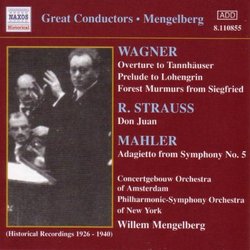| All Artists: Richard [Classical] Wagner, Engelbert [Classical] Humperdinck, Richard [1] Strauss, Gustav Mahler, Willem Mengelberg, Royal Concertgebouw Orchestra, New York Philharmonic, Philharmonic Symphony Orchestra of New York Title: Mengelberg: Wagner; R. Strauss; Mahler Members Wishing: 0 Total Copies: 0 Label: Naxos Original Release Date: 1/1/2026 Re-Release Date: 3/18/2003 Genre: Classical Styles: Opera & Classical Vocal, Forms & Genres, Theatrical, Incidental & Program Music, Historical Periods, Modern, 20th, & 21st Century, Symphonies Number of Discs: 1 SwapaCD Credits: 1 UPC: 636943185520 |
Search - Richard [Classical] Wagner, Engelbert [Classical] Humperdinck, Richard [1] Strauss :: Mengelberg: Wagner; R. Strauss; Mahler
 | Richard [Classical] Wagner, Engelbert [Classical] Humperdinck, Richard [1] Strauss Mengelberg: Wagner; R. Strauss; Mahler Genre: Classical
|
Larger Image |
CD Details |
CD ReviewsMarvelous performances in refurbished sound J Scott Morrison | Middlebury VT, USA | 04/15/2003 (5 out of 5 stars) "Dyed-in-the-wool Mahlerians revere Willem Mengelberg (1871-1951), long-time conductor of the Amsterdam Concertgebouw Orchestra, as the first major conductor, other than the composer himself, to take up and champion the music of Gustav Mahler. He conducted a complete series of the symphonies as early as 1920. Unfortunately, because the length of Mahler symphonies made them unlikely candidates for recordings in the early years, the only music of Mahler that he recorded commercially was the "Adagietto" from the Fifth Symphony. Those who don't already possess that recording need look no further. In spite of its being recorded in relatively primitive sound, and in spite of the initial recording being somewhat dim and with some pitch instability, it has been refurbished brilliantly by the recording transfer engineer and producer, Mark Obert-Thorn. I'd heard a previous issue of this performance and this one on Naxos sounds markedly fresher and truer. And that's not the only treasure on this release of late Romantic music conducted by Mengelberg. For instance, the first track is an exciting "Tannhäuser Overture" that is notable for its almost Mahlerian phrase-molding and split-second tempo modulations. It adds up to an exhilarating performance. Add to that two recordings of Mengelberg leading the New York Philharmonic-Symphony (as it was then called and whose music-director he was briefly) in the "Forest Murmurs" (from Wagner's "Siegfried") and and a lovely "Hänsel und Gretel Overture" and you realize that this CD is a real keeper. For one thing, as amazing as the sheen of the Concertgebouw was, it is apparent that Mengelberg also worked his magic with the New York orchestra, brief and troubled as his tenure with them was.One interesting thing to note: In the earliest recordings (and particularly in the Mahler) one hears fairly routinely applied string portamenti, but by the time of the last Concertgebouw recordings (the 1940 "Meistersinger Prelude") the portamenti have pretty much disappeared. Thus, these recordings trace a change in orchestral style over a fairly brief time span of fourteen years. Indeed, in the New York recordings (which are from 1928 and 1930) the portamenti are much less in evidence than in contemporaneous performances by the Concertgebouw, suggesting that American style was already discernibly different from that of a European group.Although it is in the "Adagietto" that these portamenti are most in evidence, one needs to listen only briefly before one adjusts to them. And then one can hear what has always been noted about Mahler's intention for the "Adagietto," namely that it was a love-song, not an elegy. The timing of this performance is only a little more than seven minutes, considerably faster than most modern performances. And it benefits from Mengelberg's almost supernatural ability to mould phrases carefully and yet move the music forward with urgency and passion.These will obviously not be your only recordings of these works; you will want some in modern sound. But they are not to be missed, either. Thank you, Naxos, for continuing this series of historic recordings by great conductors.Scott Morrison"
|

 Track Listings (7) - Disc #1
Track Listings (7) - Disc #1